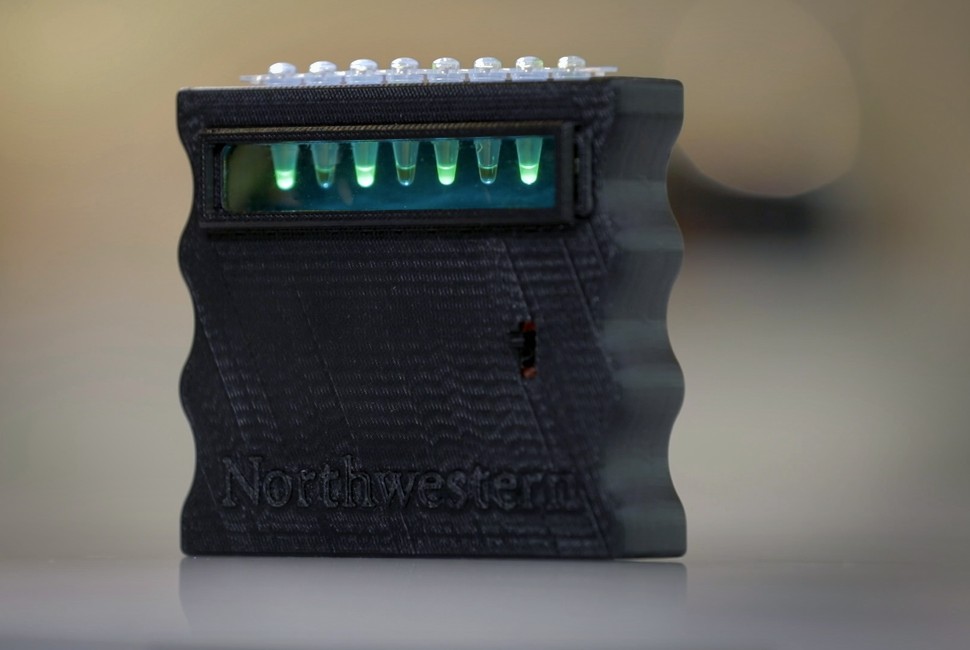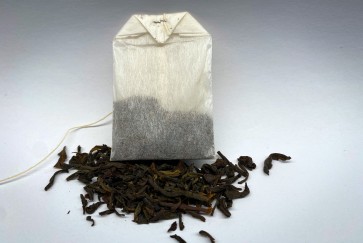Later this year, 350 Chicago-area households will receive hand-held, easy-to-use test kits to assess their home water quality.
Developed by Northwestern University researchers, the tests use cell-free biosensors and a single-drop water sample to provide an easy-to-read positive or negative result for a variety of contaminants.
The pilot study will follow a phased roll-out. The test for lead is already available and will be distributed later this year. A test for copper will be distributed during the second or third year of the study. And a test for per- and polyfluoroalkyl substances (PFAS), which is still in development at Northwestern, will be available in the fourth year.
The National Science Foundation (NSF) awarded the study a $3 million grant, announced today, through its “Using the Rules of Life to Address Societal Challenges” program. The initiative expands upon work that began within the Making Water Insecurity Visible Global Working Group, which is housed within Northwestern’s Roberta Buffett Institute for Global Affairs. The working group comprises an interdisciplinary team of researchers in engineering, chemistry, anthropology and law.
The working group and pilot study is co-led by husband-wife team Julius Lucks and Sera Young.
“This grant is timely, as water quality and climate change continue to pose challenges, while the dangers of lead and PFAS are becoming more well-known,” said Lucks, an expert in synthetic biology. “This initiative unites researchers from across the University to tackle major societal challenges related to sustainability and the environment. It’s a great example of what we can do when we learn to speak each other’s languages and work together.”
Information is power, and these tests make invisible issues visible.”
Water insecurity expert
“The end goal is to empower people with knowledge: The knowledge of whether or not lead is in their water,” said Young, a water insecurity expert. “These tests do this by offering the same certainty and simplicity found in at-home COVID-19 and pregnancy tests. Information is power, and these tests make invisible issues visible. We hope that families and organizations can use the tests in their daily activities to understand where the problems are in Chicago and that policymakers can take action based on the information they generate.”
Lucks is a professor of chemical and biological engineering at Northwestern’s McCormick School of Engineering and co-director of the Center for Synthetic Biology (CSB). Young is an associate professor of anthropology and global health at Northwestern’s Weinberg College of Arts and Sciences, member of the CSB and fellow of the Institute for Policy Research (IPR).
To distribute the test kits, the researchers have consulted and intend to partner with community-area groups (including Blacks in Green and Bridges // Puentes, among others) and the City of Chicago. Using the at-home tests, residents will measure the levels of lead, copper and PFAS in their household water. Then, they will receive laboratory analysis results, along with water filters and resources for how to access further remediation, if needed.
The research is aligned with policy goals outlined by U.S. senators Tammy Duckworth and Dick Durbin to ensure clean and safe drinking water across Illinois and nationwide.
“This pilot study is the ideal example of how federal funding through the National Science Foundation puts essential and accessible information in the hands of households,” Durbin said. “I had the opportunity to meet with members of this working group to discuss their research, as well as Blacks in Green. This partnership will result in invaluable progress in securing not just a better understanding of households’ water quality, but overtime, trust that the water coming out of their tap is safe for their family.”
The lead and copper tests are based on ROSALIND, the hand-held platform developed in Lucks’ laboratory. Named after famed chemist Rosalind Franklin, the platform is equipped with eight small test tubes that each hold freeze-dried bio-sensors. Adding a drop of water to each tube sets off a network of reactions and interactions, ultimately causing the freeze-dried pellet to glow in the presence of a contaminant. By glowing green, the test provides an easy-to-read, visual result for the user.
Currently in development at Northwestern, the PFAS test will combine ROSALIND technology with new breakthroughs from the lab of William Dichtel, the Robert L. Letsinger Professor of Chemistry at Weinberg and member of the Buffett Institute working group. An expert in contaminant detection and water purification, Dichtel and his team last year discovered a new process capable of destroying PFAS, toxic compounds that are notoriously impossible to break apart.
“Recent studies estimate that up to half of the drinking water in the United States is contaminated with PFAS, but the concentrations are so low that inexpensive detection is challenging,” Dichtel said. “The project will combine recent Northwestern breakthroughs in PFAS capture and destruction with ROSALIND to achieve the sensitivity needed to address this longstanding challenge.”
Other Northwestern members of the research team are: Jean-Francois Gaillard, professor of civil and environmental engineering at McCormick; Michael Jewett, adjunct professor at McCormick; Ashty Karim, research assistant professor of chemical and biological engineering at McCormick; and Rob Weinstock, clinical associate professor of law at Northwestern Pritzker Law and director of the Bluhm Legal Clinic’s Environmental Advocacy Center.
Northwestern startup company Stemloop is commercializing the ROSALIND technology. Lucks has financial interests in and affiliations with Stemloop. Northwestern has financial interests (equity, royalties) in Stemloop.


